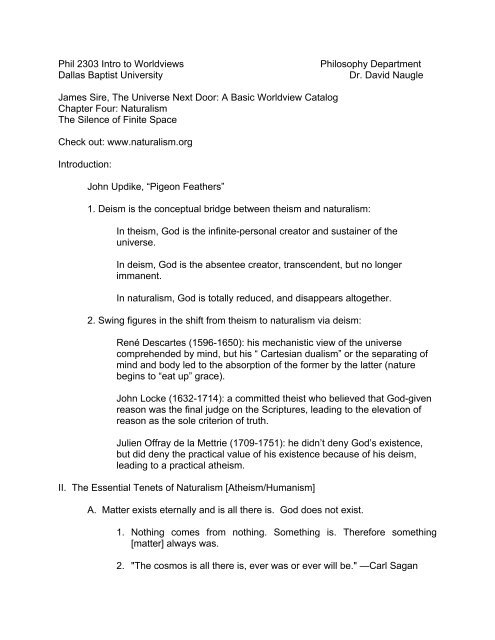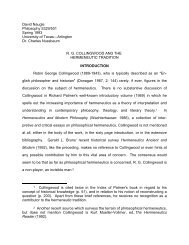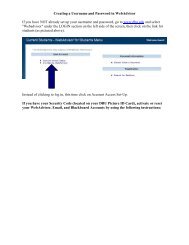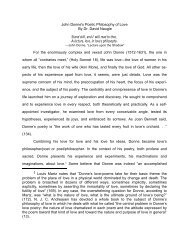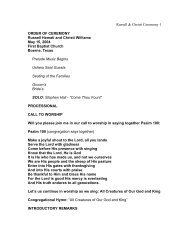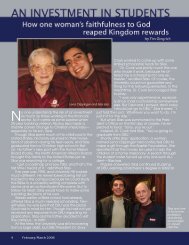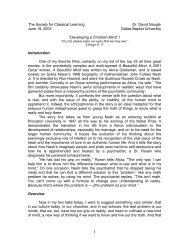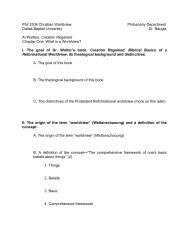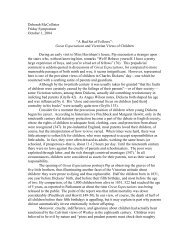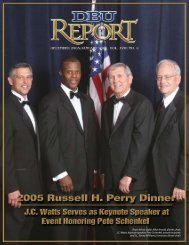Phil 2303 Intro to Worldviews - Dallas Baptist University
Phil 2303 Intro to Worldviews - Dallas Baptist University
Phil 2303 Intro to Worldviews - Dallas Baptist University
You also want an ePaper? Increase the reach of your titles
YUMPU automatically turns print PDFs into web optimized ePapers that Google loves.
<strong>Phil</strong> <strong>2303</strong> <strong>Intro</strong> <strong>to</strong> <strong>Worldviews</strong> <strong>Phil</strong>osophy Department<br />
<strong>Dallas</strong> <strong>Baptist</strong> <strong>University</strong> Dr. David Naugle<br />
James Sire, The Universe Next Door: A Basic Worldview Catalog<br />
Chapter Four: Naturalism<br />
The Silence of Finite Space<br />
Check out: www.naturalism.org<br />
<strong>Intro</strong>duction:<br />
John Updike, “Pigeon Feathers”<br />
1. Deism is the conceptual bridge between theism and naturalism:<br />
In theism, God is the infinite-personal crea<strong>to</strong>r and sustainer of the<br />
universe.<br />
In deism, God is the absentee crea<strong>to</strong>r, transcendent, but no longer<br />
immanent.<br />
In naturalism, God is <strong>to</strong>tally reduced, and disappears al<strong>to</strong>gether.<br />
2. Swing figures in the shift from theism <strong>to</strong> naturalism via deism:<br />
René Descartes (1596-1650): his mechanistic view of the universe<br />
comprehended by mind, but his “ Cartesian dualism” or the separating of<br />
mind and body led <strong>to</strong> the absorption of the former by the latter (nature<br />
begins <strong>to</strong> “eat up” grace).<br />
John Locke (1632-1714): a committed theist who believed that God-given<br />
reason was the final judge on the Scriptures, leading <strong>to</strong> the elevation of<br />
reason as the sole criterion of truth.<br />
Julien Offray de la Mettrie (1709-1751): he didn’t deny God’s existence,<br />
but did deny the practical value of his existence because of his deism,<br />
leading <strong>to</strong> a practical atheism.<br />
II. The Essential Tenets of Naturalism [Atheism/Humanism]<br />
A. Matter exists eternally and is all there is. God does not exist.<br />
1. Nothing comes from nothing. Something is. Therefore something<br />
[matter] always was.<br />
2. "The cosmos is all there is, ever was or ever will be." —Carl Sagan
For Sagan, the universe assumes the position of God, and science<br />
becomes religion.<br />
3. Naturalism, therefore, is atheism. "Man is the supreme being for man."<br />
—K. Marx.<br />
4. "Religion is a human invention, a projection of the human potentiality"<br />
—L. Feuerbach.<br />
B. The cosmos exists as a uniformity of cause and effect in a closed system.<br />
1. Nature is indeed the “whole show,” but it need not be conceived as a<br />
“machine” or “clock” as in deism; in naturalism, the universe may be far<br />
more mysterious and complex, esp. at the suba<strong>to</strong>mic level.<br />
2. Naturalism is determinism since all things occur from within by natural<br />
causes and their effects. though human beings may still possess a<br />
(false) sense of freedom.<br />
3. Naturalism is a closed system in that it is not open <strong>to</strong> reordering from<br />
the outside either by God or human beings.<br />
C. Human beings are complex "machines"; personality is an interrelation of<br />
chemical and physical properties we do not yet fully understand.<br />
1. Human beings, the product of evolution, are simply a part of the<br />
machinery of the cosmos in which there is only one substance: matter.<br />
We possess no truly transcendent dimension (like a soul or self).<br />
"Man is a machine, and in the whole universe there is but one<br />
single substance [matter] with various modifications."—J. LaMettrie<br />
"Man, the microcosm, is just another machine within the universal<br />
machine that is the cosmos." —W. Barrett.<br />
2. Mind is a function of matter and the machine and is only the result of a<br />
highly misunders<strong>to</strong>od mechanical complexity.<br />
"The brain secretes thought as the liver secretes bile." —P.<br />
Cabanis.<br />
Human beings "are what they eat." —L. Feuerbach.<br />
3. Nonetheless, most naturalists will insist on human uniqueness and<br />
value; the basis for this distinction is the human capability for<br />
2
conceptual thought, speech, tradition, a unique evolution, moral<br />
behavior, culture, etc.<br />
4. Some naturalists even insist on human freedom, arguing along<br />
compatibilist lines that a closed and determined physical universe is<br />
compatible with human freedom, since it is clear that we can always do<br />
what we want, and other than we do.<br />
D. Death is extinction of personality and individuality.<br />
1. "As far as we know, the <strong>to</strong>tal personality is a function of the biological<br />
organism transacting in a social and cultural context. There is no<br />
credible evidence that life survives the death of the body."<br />
—Humanist Manifes<strong>to</strong> II<br />
2. "No fire, no heroism, no intensity of thought and feeling, can preserve<br />
an individual life beyond the grave." —B. Russell.<br />
3. "I take it <strong>to</strong> be fact that one's existence ends at death." —A. J. Ayer.<br />
4. “Human destiny is an episode between two oblivions.” E. Nagel<br />
5. Immortality is limited <strong>to</strong> one’s progeny, and the way our lives have<br />
influenced others in culture (Abraham Lincoln’s goodness enduring<br />
after him).<br />
E. His<strong>to</strong>ry is a linear stream of events linked by cause and effect but without an<br />
overarching purpose.<br />
1. His<strong>to</strong>ry as used here includes both natural and human his<strong>to</strong>ry since for<br />
the naturalist, these are in continuity, and human beings arose out of<br />
and will return <strong>to</strong> nature.<br />
2. The beginning of life and the process of his<strong>to</strong>ry were self-activating,<br />
that is, via evolution; it was not set in motion by an Unmoved Mover or<br />
by God.<br />
a. Darwinian evolution, frequently presented as fact, provided the<br />
mechanism <strong>to</strong> explain life without God.<br />
“Organic evolution is a process entirely materialistic in its<br />
origin and operation. . . . Life is materialistic in nature....”<br />
—G. G. Simpson<br />
3
. Not all evolutionists are naturalists; some attempt <strong>to</strong> combine<br />
belief in God with evolution (theistic or deistic evolution). For the<br />
latest literature and discussion, see the following:<br />
• Daniel Dennet, Darwin’s Dangerous Idea, 1995.<br />
• Michael Den<strong>to</strong>n, Evolution: A Theory in Crisis, 1985.<br />
• Charles Hummel, The Galileo Connection, 1985.<br />
• Howard J. Van Till, The Fourth Day, 1986.<br />
• Howard J. Van Till, Davis A. Young, Clarence Menninga,<br />
Science Held Hostage, 1988.<br />
• <strong>Phil</strong>lip Johnson, Darwin on Trial, 1993.<br />
• <strong>Phil</strong>lip Johnson, Reason in the Balance, 1995.<br />
• Charles B. Thax<strong>to</strong>n, Walter L. Bradley, and Roger Olsen,<br />
The Mystery of Life’s Origin, 1984.<br />
• J. P. Moreland, ed. The Creation Hypothesis, 1994.<br />
• Michael Behe, Darwin’s Black Box: The Biochemical<br />
Challenge <strong>to</strong> Evolution, 1996<br />
• Del Ratzsch, The Battle of Beginnings: Why Neither Side<br />
is Winning the Creation-Evolution Debate, 1996.<br />
3. When in the evolutionary process human beings appeared, so <strong>to</strong>o did<br />
human his<strong>to</strong>ry. But just as evolution itself has no inherent or predetermined<br />
goal, so neither does human his<strong>to</strong>ry. It just goes and will<br />
last as long as human beings last.<br />
Man’s “number came up in the Monte Carlo game, a game of pure<br />
chance.” Jacques Monod<br />
“Natural selection is the blind watchmaker, blind because it does<br />
not see ahead, does not plan consequences, has no purpose in<br />
view.” Richard Dawkins<br />
F. Ethics is related only <strong>to</strong> human beings.<br />
1. For a theist, God is the foundation for morals which are revealed in His<br />
Word; for a naturalist, however, values are entirely man made. "Man is<br />
the measure [determiner] of all things," including ethics.<br />
2. No natural law is inscribed in the universe, or in the consciousness of<br />
human beings; whatever moral imagination or sentiment human beings<br />
have they have acquired from cultural convention, authority, or<br />
intuition. Hence, there are no objective moral ideals <strong>to</strong> order human life<br />
or <strong>to</strong> discipline human conduct.<br />
3. "We affirm that moral values derive their source from human<br />
experience. Ethics is au<strong>to</strong>nomous and situational, needing no<br />
4
theological or ideological sanction. Ethics stems from human need<br />
and interest." —Humanist Manifes<strong>to</strong> II.<br />
4. The problem arises if humans create ethics: how do you move from<br />
what is done <strong>to</strong> what should be done: is/ought fallacy.<br />
For more on naturalism, see C. S. Lewis’s Miracles, esp. part one.<br />
III. Comparing Christian Theism and Naturalism<br />
Christian Theism Naturalism<br />
1. Reality/metaphysics God exists; Crea<strong>to</strong>r/creation Universe is self-existent; no<br />
God is personal/moral God; God is illusion/superstition<br />
God upholds creation/very projection; matter/energy<br />
good; open system closed system/determinism<br />
2. Knowledge/epistemology Truth exists in God, revealed Man is the measure of all things/<br />
in creation, Christ, Scripture Homo mensura; reason, experience<br />
science<br />
3. Ethics Determined by God; disclosed Determined by man; disclosed by<br />
in Revelation (natural/special) reason and experience; au<strong>to</strong>nomous,<br />
Discovered by man situational, relative<br />
4. Nature of human beings Imago Dei (whole person is Evolved from lower primates;<br />
image of God); now fallen; advanced, complex, conscious<br />
redeemed by Christ animal<br />
5. Human predicament Sin-rebellion against God Superstition/ignorance; environment<br />
leading <strong>to</strong> separations from genetics; economics; unconscious<br />
self, others, creation mind; etc.<br />
6. Solution <strong>to</strong> human pred. Salvation in Jesus Christ Science, reason, technology, education<br />
res<strong>to</strong>ration <strong>to</strong> God, self, robust economy, genome project,<br />
others, world psycho-analysis/thearpy, etc.<br />
7. His<strong>to</strong>ry Creation/fall/redemption Big bang until???? Linear, no<br />
already/not yet; linear/ final purpose<br />
purposeful<br />
8. Death Eternal life with God; Extinction; end of existence<br />
eternal damnation w/o God<br />
9. Jesus Christ Son of God/Son of Man Moral teacher, prophet, entirely<br />
2d person of Trinity; Lord/ human (not God)<br />
Savior; God incarnate<br />
5
III. Two Important Varieties of Naturalism: Secular Humanism and Marxism<br />
A. Secular Humanism<br />
B. Marxism<br />
1. Definition of humanism (generically): human beings are unique and of<br />
special value; their aspirations, thoughts, and yearnings are significant.<br />
2. Two types of humanism<br />
a. Christian humanism: Asserts that human dignity and value is<br />
derived from the image of God in each person. In this sense,<br />
Christianity is the true humanism! Men such as Calvin, Erasmus,<br />
Shakespeare, and Mil<strong>to</strong>n fall in<strong>to</strong> this camp.<br />
b. Secular humanism: Asserts the value and dignity of human<br />
beings within the context of a naturalistic world view. See the<br />
Secular Humanist Declaration, and the Humanist Manifes<strong>to</strong>’s I, II.<br />
1. Karl Marx (1818-83)<br />
2. <strong>Phil</strong>osophical influence<br />
a. Georg Wilhelm Friedrich Hegel (1770-1830): dialectical idealism<br />
of the Absolute Spirit<br />
b. Ludwig Feuerbach (1804-72): atheistic materialism<br />
3. Marxist dialectical/his<strong>to</strong>rical materialism<br />
4. Critique<br />
a. His<strong>to</strong>ry is the his<strong>to</strong>ry of class struggle.<br />
b. Economic fac<strong>to</strong>rs are the primary determinants of that his<strong>to</strong>ry.<br />
c. Revolution of the proletariat establishes a new economic order.<br />
d. The new classless society will emerge producing the "new<br />
socialist individual" overcoming alienation and establishing an<br />
ideal state or u<strong>to</strong>pia.<br />
a. Is human his<strong>to</strong>ry moving <strong>to</strong>ward an ideal society? Atheistic<br />
Marx had no real basis for this belief.<br />
b. Are human beings really motivated <strong>to</strong> work <strong>to</strong>ward this future<br />
society? With no transcendent reason for doing so, the<br />
motivation is at best minimal.<br />
6
c. Is Marx view of human nature realistic? Is it plausible <strong>to</strong> think<br />
that selfishness and greed are solely the product of scarcity and<br />
class division? Will the right environment produce "good"<br />
human beings? Unlikely on both counts.<br />
IV. The Persistence of Naturalism and a Critique<br />
A. Its persists for two reasons<br />
B. Critique<br />
1. It gives the impression of being honest and objective.<br />
2. It gives the impression of being coherent.<br />
1. Does naturalism give adequate reason <strong>to</strong> consider human beings<br />
unique? Naturalism is optimistic about man but without an adequate<br />
basis.<br />
2. Does naturalism give adequate reason <strong>to</strong> trust the human ability <strong>to</strong><br />
know? How can you trust your thought if thought is just result of<br />
chemical properties? Maybe I am <strong>to</strong>tally deceived.<br />
7


